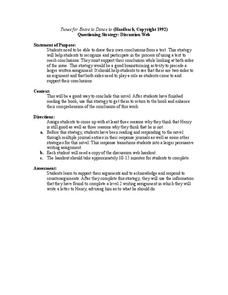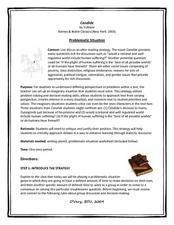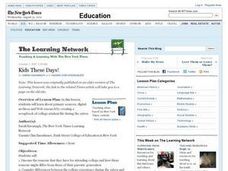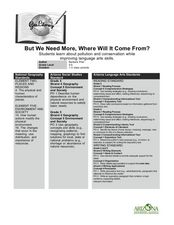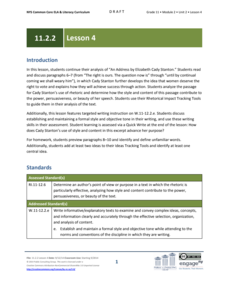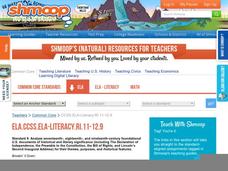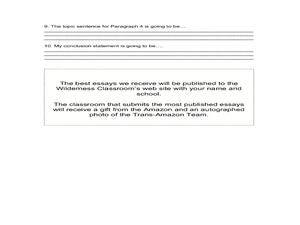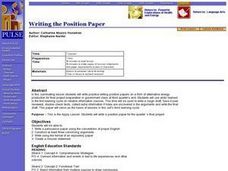Curated OER
Tunes for Bears to Dance to: Questioning Strategy, Discussion Web
Readers of Robert Cormier's Tunes for Bears to Dance to are asked to consider the morality of the central character's actions
Curated OER
Shizuko’s Daughter: Discussion Web
Is Yuki a selfish character? Analyze her motivation and behavior during a unit on Shizuko's Daughter by Kyoko Mori. Readers fill out two sides of a graphic organizer with reasons why or why not she is selfish, and then come up with a...
Curated OER
Spinning Your Wheels
Students read various articles related to transportation and land use. They cite textual references as they engage in panel discussions, shared inquiry discussions and debates. They write a persuasive essay on the topic.
Curated OER
That Was Then, This is Now: When I Was Puerto Rican
Pupils explain how geographic/cultural setting influences identity by comparing/contrasting Esmeralda's Puerto Rican self with her American self. They closely read text to pinpoint when Esmeralda was no longer Puerto Rican. Students...
Curated OER
Papyrus to PDA
What a great project. Graphic arts students consider the social, political, and economic impact made by a chosen invention. They build an argument to substantiate their reasons for choosing said invention. They create an oral...
Curated OER
"Shooting An Elephant": George Orwell's Essay on His Life in Burma
High school readers examine George Orwell's essay "Shooting an Elephant" for examples of symbolism, metaphor, connotation, and irony. They analyze how these literary tools convey the writer's main point and contribute to the persuasive...
Museum of Tolerance
Immigration Journeys
Through the journey of four stories of immigration, scholars complete graphic organizers and apply knowledge to create a visual representation of their findings on a large poster. Third and fourth readers write a letter to their family...
Curated OER
Candide: Problematic Situation
"Would a rational and well-regulated world include human suffering?" "If the plight of human suffering is the 'best of all possible worlds' do humans have freewill?" Class members develop their position on an issue raised by Candide,...
Curated OER
Kids These Days!
Students create a scrapbook of college student life during the 1960's using digital archives and Internet research. They read and discuss the article "What's the Matter With College?" and then compare college experience of today with...
Museum of Tolerance
The Role of Citizens in a Participatory Democracy
Groups research participatory democracies and compare the role and rights of citizens in ancient history with those in recent U.S. history. Guided by a series of questions, individuals compose a persuasive essay in which they discuss the...
Curated OER
Down And Dirty
Students practice reading and review holiday language. They practice comparatives and superlativies, and the language of persuasion.
Curated OER
Life's a Beach And It's on Your Doorstep
Students practice reading for details and review holiday vocabulary. They practice comparatives and superlatives.
Curated OER
Social Studies Strategies: Opinion Proof
In this strategy worksheet, students read about opinions and their proof, then use a "column note" graphic organizer to write an opinion on the left, and the support, or proof of the opinion on the left.
Curated OER
But We Need More, Where Will It Come From?
Young scholars write a persuasive letter and create a poster about pollution and conservation. In this pollution and conservation lesson plan, students learn how humans are the number 1 cause of pollution.
Curated OER
Oil Production Examining History - Finding the Truth
For this oil production worksheet, students click on the links to read about oil production and then answer short answer questions. Students also write a persuasive essay about what they think should be done.
EngageNY
Grade 11 ELA Module 2: Unit 2, Lesson 4
How does style contribute to the power and persuasiveness of a speech? With the question in mind, scholars continue reading "An Address by Elizabeth Cady Stanton." They complete a Rhetorical Impact Tracking Tool to guide them in their...
Curated OER
The death penalty; What is your view?
Students write a persuasive essay about the death penalty. Students respond to students at St. Ignatius Catholic High School in Cleveland protesting the death of Adremy Dennis. Students research both sides of the debate, before writing...
Shmoop
ELA.CCSS.ELA-Literacy.RI.11-12.9
Guided by close-reading questions, groups examine the similarities and differences between the Declaration of Independence and the Bill of Rights. In addition, they look at how the principles are presented in these two foundational US...
Curated OER
Finding the dress code balance
Students write a persuasive essay, expressing their opinions of how the school dress code should be changed. Students investigate their own school's dress code, developing their own opinions of whether the dress code should be more or...
Curated OER
Author's Day
Have your learners choose an author to study. One resource link gives a list of approved authors. Scholars read at least three works produced by that author and produce three separate book reports as well as a two-page author report....
Curated OER
Publish Your Daily Dilemma Results
Young scholars fill out an outline and write an expository text on a dilemma that they read about. They brainstorm how they can solve the dilemma, write about it, then submit their suggestions to the Wilderness Classroom Expedition Team.
Curated OER
Popular Sovereignty Under the Kansas-Nebraska Act
Seventh graders examine the implications of the Kansas-Nebraska Act. In this slavery instructional activity, 7th graders examine a map of 1820 America and discuss the balance of power implied by the map. Students then read Stephen...
Curated OER
Writing the Position Paper
Students write position papers on a form of alternative energy production. They use several class periods to develop and write their paper and them participate in an extensive peer review session.
Curated OER
Language Arts: Sentence Variety and Fluency
Young scholars are able to identify, create, and evaluate three kinds of sentences: simple, compound, and complex. They are able identify the purpose of various sentence types: declarative, interrogative, imperative, exclamatory, and...


